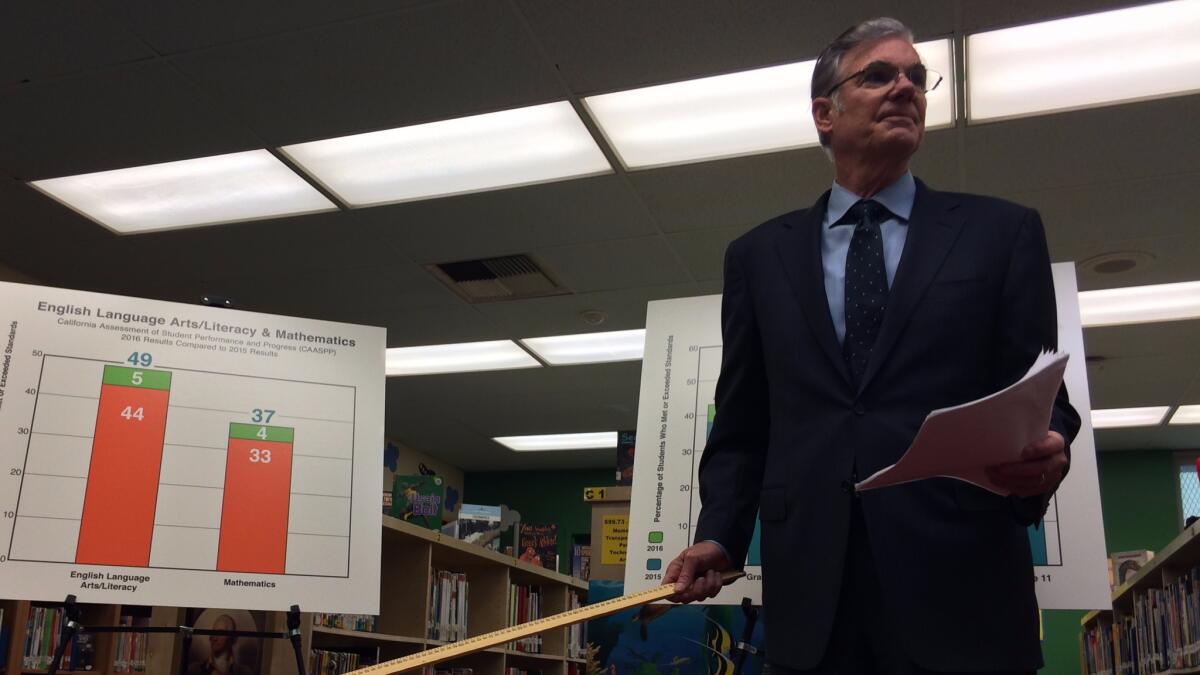California and local education officials laud progress on still-lagging test scores

State and local education officials gathered at Eagle Rock Elementary School on Wednesday to celebrate upward progress in newly released student test scores, even as the overall results showed less than half of students meeting learning goals.
The scores were notably lower in Los Angeles Unified — although there, too, there was improvement over last year on the new online tests, which are more difficult than those they replaced.
“We’re setting high goals,” said state Supt. of Public Instruction Tom Torlakson. “High expectations, high hopes, combined with resources has made a difference.”
“Is this where we want to be?” Torlakson said. “No.”
Torlakson also acknowledged that schools have been unable to close the size of the gap in test scores between higher-income white and Asian students and their black, Latino and lower-income peers.
“Unfortunately, we didn’t see the achievement gap narrow,” he said. “It’s real and we have to do more effort.”
Torlakson said he’d created a team to work on tackling the problem. He also predicted the new tests would prove a rich resource both to guide instruction and find models of classrooms and schools that are succeeding.
Statewide, 48% of students met or exceeded the state’s learning targets in English Language Arts, a gain of five percentage points over the scores from last year’s initial use of the test.
In L.A. Unified, the figure was 39%, a gain of six percentage points.
In math, 37% of California students met or exceeded the learning targets, four percentage points better than 2015.
In L.A. Unified, the figure was 29%, an increase of four percentage points.
“The Board of Education is proud of these results,” said L.A. school board President Steve Zimmer. “This district is continuing to make progress.”
Zimmer added that test scores were not the only measure, and not necessarily the most important, but provided “an indicator that progress is steady.”
He also took on district critics.
“The narrative that somehow public education is failing in Los Angeles … is simply a fictional narrative.” All over the district, he said, “you will see professionals, teachers, parents, students working together to continuously improve and get to better.”
Also on hand was L.A. schools Supt. Michelle King, who echoed the upbeat tone.
“LAUSD students achieved gains at every level,” King said. “We must continue striving to close the achievement gap and provide the resources needed to help children succeed.”
Progress was the watchword. Torlakson’s chart was drawn so that the less-than-50% proficiency rate in English rose nearly to the top of the poster on display. There was literally no room for the majority of students who are not yet meeting learning goals.
That emphasis was endorsed by David Rattray, executive vice president for education and workforce development for the Los Angeles Area Chamber of Commerce.
“These are by far the highest standards that we’ve put before students in the history of California,” Rattray said. “These standards are tough. They’re high. The business community was part of helping define them.”
He said the results are especially encouraging because more students are staying in school and graduating, and many of those additional students are more likely to score poorly on tests.
“We’re keeping them in school and they’re getting to the finish line,” Rattray said. “That’s a big deal.”
The news conference was held in the library at Eagle Rock Elementary, a popular, diverse campus with about 780 students. It hosts a neighborhood school as well as special programs for academically gifted students.
During the depths of the recent recession, the district completely cut library funding for the school, but parents raised enough money to keep a library aide for three hours a day, every other week.
Improved state funding has allowed the district to restore six hours of daily library service, though still every other week, said library aide Cathy Ellingford, who has begun her 24th year at the school.
Local PTA board member Theresa Coxwell, who watched the press event, said she was encouraged. Her son, who just started first grade, had previously attended a private preschool.
“We’ve been hearing about the new testing and it is a little nerve-wracking,” Coxwell said. “To hear that there’s been improvement at a public school setting, it’s exciting.”
Twitter: @howardblume
MORE EDUCATION NEWS
State standardized test scores are out: What do they mean?
Look up how your school scored on the latest California K-12 tests
More to Read
Sign up for Essential California
The most important California stories and recommendations in your inbox every morning.
You may occasionally receive promotional content from the Los Angeles Times.











